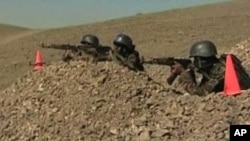World powers are scrambling to find a way to help Yemen fight extremism and the conditions that breed it. The poorest Arab nation has been drawn back into the spotlight after Yemen-based al-Qaida members claimed responsibility for a failed attempt to blow up an airplane in the U.S. last month.
Yemen's military has been gearing up to fight an apparently resurgent al-Qaida offshoot.
It's getting help from the U.S., both in training and logistical support, as well as the attention of international powers determined to stop extremists from gaining an entrenched position on the Arabian Peninsula.
The problem is not clear-cut.
The central government has little control over large parts of the country. Beyond the mountains that surround Sana'a are a rebellion, a secessionist movement, and remote tribal regions where al Qaida members have set up base.
Barbara Bodine was U.S. ambassador to Yemen when al-Qaida members blew up the USS Cole in Aden in 2000. She says the international community needs to refocus its energies on Yemen.
"Right now we have a fragile, but not failed state," she noted. "If we don't do this smart now, we will have to pour in the kind of money that we are pouring into Afghanistan and Iraq."
Yemen faces enormous challenges. There is widespread poverty, in addition to political instability, as well as a decline in oil production and water shortages. The central government has yet to address the issues systematically.
Ahmed Seif is a political science professor at Sana'a University.
"There is a high level of corruption," he explalined. "There is resources mismanagement. And those couple of reasons have contributed greatly to the emergence of terrorism in Yemen. And not only this, those who are not terrorists are extremely deprived and they will be sympathetic to al Qaida."
Yemen has no long history of extremism. Rather, the country is divided largely along tribal lines with allegiances shifting depending on the situation. Khaled al-Ashdaa speaks for his father, Ghaleb al-Ashdaa, sheikh of the powerful Murad tribe of eastern Yemen. They accuse the government of lumping its opponents together with the militants.
"Al-Qaida, or what is called al-Qaida, are people who have problems and the country can solve their problems, but it's become an excuse. If they want someone, they label him al-Qaida, like what they term terrorism, and it's just an excuse," he said.
Sorting out who is committed to terror and helping those who are just discontent with present conditions could go a long way to disrupting al-Qaida's bid to become entrenched.
"Very tangible developmental projects have to be launched very quickly in order to be felt by the citizens," added Ahmed Seif. "This package can help. And I would say, if this is implemented successfully, there will be no al-Qaida in two years time."
But with governments everywhere dealing with the recession, it's not clear how much the world can devote to Yemen's problems right now.





